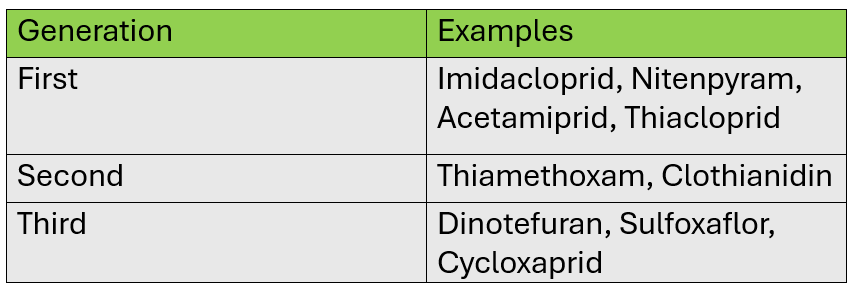Insecticide poisoning- Neonicotinoids

Neonicotinoids are newer insecticides which are less toxic to humans compared to organophosphates. This group of insecticides are neurotoxic and specifically acts on nicotinic Acetylcholine receptors in central nervous system. EPA has classified neonicotinoids as class II and class III toxins. Even though used widely in the field of horticulture, these compounds are found to be toxic to bees.
Classification

Mechanism of action
Post synaptic nicotinic Acetylcholine receptors(nAChRs) –(parasympathetic> sympathetic)
Binds irreversibly to nAChRs, initially stimulate and the blocks Na+/K+ channels. These are absorbed through skin and mucous membrane.
Clinical features
- Neurological: Agitation, Extrapyramidal symptoms, seizures, hallucinations, respiratory depression, varying degree of paralysis, coma
- Cardiovascular: extrasystoles, transient hypertension, AV block, severe sinus bradycardia, asystole, shock, malignant hypertensive disorder
- Respiratory: airway irritation, cough, shortness of breath, stridor, respiratory distress, bronchospasm
- GI: vomiting, diarrhea, abdominal pain, dysphagia, GI hemorrhage, perforation
- Renal: proteinuria, hematuria, severe metabolic acidosis, AKI
- Liver: elevated transaminases, acute liver failure
- Muscle: pain, cramps, fasciculations, rhabdomyolysis, compartment syndrome
- Blood: hemolysis, methemoglobinemia, coagulation disorders, anemia, thrombocytopenia
N-methyl pyrrolidone – commonly used as solvent in neonicotinoids can cause corrosive damage to the mucosa
Consumption of neonicotinoids with alcohol is found to cause severe disease
Management
- Dermal and mucosal decontamination
- Gastric lavage and activated charcoal (if presentation within 1 hour)
- Gastric lavage contraindicated if mucosal corrosive injury present
- Mechanical ventilation (GCS<8, respiratory distress, status epilepticus)
- In some cases, muscarinic symptoms may be present (lacrimation, emesis, bronchorrhea, excessive salivation) mimicking organophosphate poisoning. If symptoms are severe, Atropine can be given.
- Other supportive management

Leave a Reply